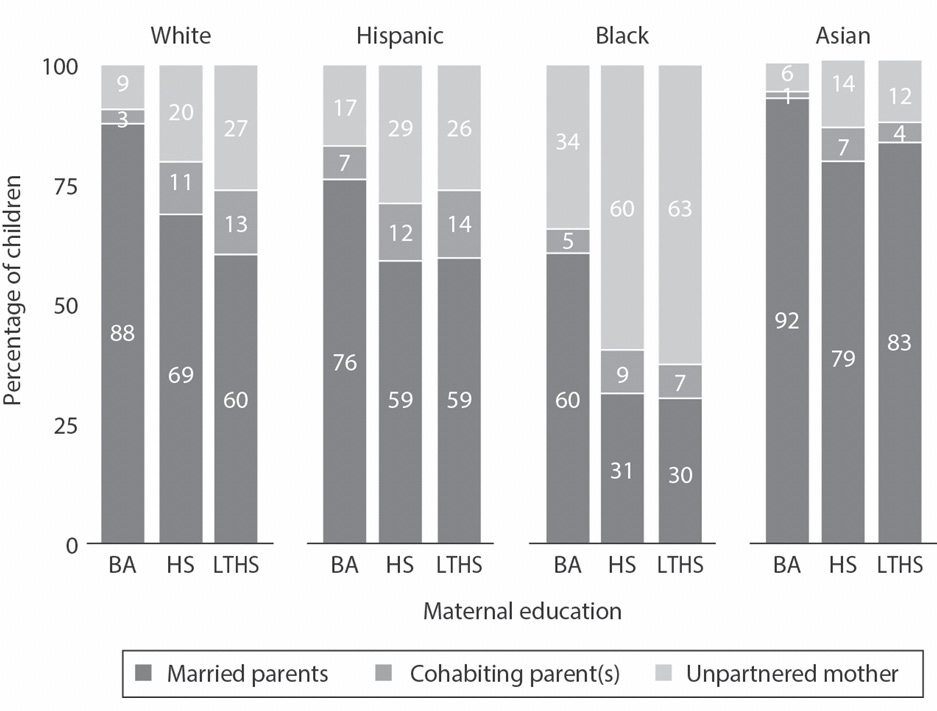“The Two-Parent Privilege” by Melissa Kearney (review)
“The Two-Parent Privilege” - a new book by Professor Melissa Kearney - advances 10 key claims. Let’s assess!
Single motherhood is rising, primarily amongst women with less education.
Children of single mothers (especially sons) have lower social mobility. They are more likely to remain in poverty and less likely to graduate from college.
If we care about poverty and inequality, this discussion is entirely legitimate. It needn’t imply shame or stigma.
Economics partly explains the decline in marriage. If working class men lack decent jobs and earn little more than poor women, they become less attractive grooms.
Culture also matters. Even when male wages increased during a fracking boom, marriage rates remained low.
Financial resources, supportive parenting, reading together, and warmth confer massive inter-generational benefits. In all four respects, single mothers are disadvantaged. Shattered and stressed, they struggle to match “the two parent privilege”.
Boys are especially sensitive to parental inputs (Bertrand & Pan).
Kids do better when they have a more nurturing environment and better schooling - which could be achieved via greater government investment.
Fertility is down not due to economics, but a shift in cultural priorities. An MTV show on teenage mums made girls much more averse!
All 9 claims above seem plausible, but it’s hard to match like for like. Would non-marrying men necessarily make great fathers if they tied the knot? Or is something else going on? This leads me to a further concern, with her 10th claim…
🥁🥁🥁
Kearney suggests that we could abate the decline in marriage by “fostering a norm of two parent homes for children”. But Black Americans are already the least supportive of single parents. Kearney seems to be pushing for something that is already idealised: married parents.
Kearney’s strategy is undercut by one crucial fact, which we learn from qualitative research (like Elijah Anderson’s majestic book, “Code of the Street”):
Many high-school educated women want to marry, they envy happy weddings, but decry the dearth of “marriageable men”.
Earlier this year, I listened to waitresses, cooks, laundromat workers, and taxi drivers in Montgomery. At odds with Kearney, they emphasised low trust.
Kearney’s push for celebrations of two parent families may be putting the cart before the horse. If distrust is pervasive, relationships remain fragile. They fracture and break. The missing piece of the jigsaw is the decline in long-term stable unions. Parenthood is downstream.
For more on this, see my piece “A Unified Theory of Marriage”.
Kearney’s book is an engaging read, on a hugely important topic. But my Economics friends could benefit from more engagement with qualitative research, on why relationships fall apart.








I haven't read the book yet (though this review reminded me that I plan to order it, and should). So maybe I will change my mind one way or another after reading it.
But my initial impression seems to be that you're *both* right. Meaning: you are absolutely correct that low trust is a major impediment to forming stable relationships. But let's unpack that further. Why is there such low trust? The obvious answer is, too many young men show themselves to be untrustworthy.
Take that back one more step. Why are they untrustworthy? I suspect it is in no small part due to the lack of positive male role models, and the overwhelming presence of *bad* role models, who encourage caddish behavior. Whether these are in the media they consume, or in their lives, there are a lot of them.
Small children don't start out being reliable and responsible, someone has to teach them to be. Someone has to override malign influences from the outside and maybe even the inside. Government can't do this. Mothers can do this when their sons are little, but young men going through puberty and dealing with the flood of testosterone it unleashes can be very difficult for their mothers to understand and relate to. Grandfathers are elderly, and weak. Uncles and teachers are not there all the time, and don't love these boys as unconditionally as a parent would. Who is left?
It has to be their fathers. Who else can it be? This is where I think I agree with Kearney -- the norm has to be that dad sticks around and marries his kids' mother, and goes through the day-to-day with her. That he models responsibility, and love. And that the culture shames and ostracizes men who parent from a distance (or not at all), rather than just shrugging off "deadbeat dads" and garnishing their paychecks.
It’s been a while but I read PROMISES I CAN KEEP, a study of impoverished single mothers in Philly. The problem there wasn’t that the men didn’t have good jobs (though they didn’t), it was that they were embroiled in drugs, crime, violence and philandering. IIRC While women could gain status with their peers by caring for their children, men did not (their friends might taunt them as “whipped” etc).